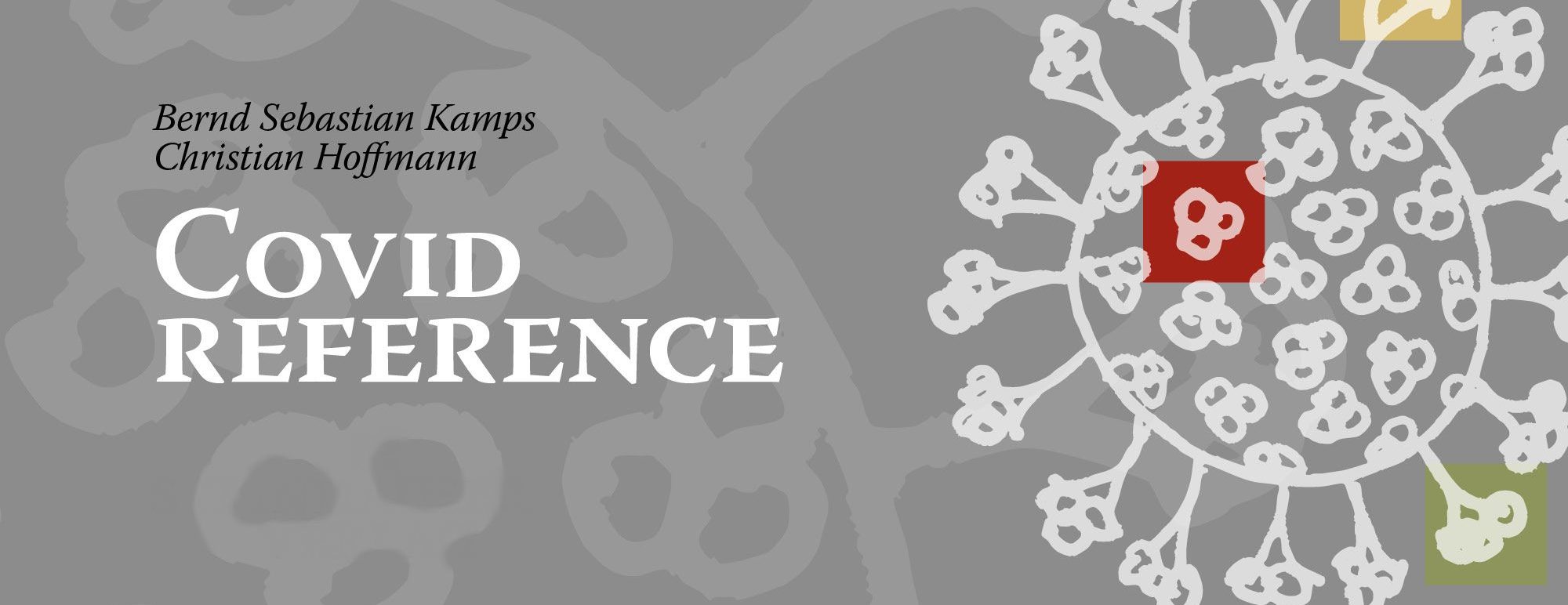By Christian Hoffmann &
Bernd S. Kamps
Epidemiology
Nickbakhsh S, Ho A, Marques DFP, McMenamin J, Gunson RN, Murcia PR. Epidemiology of seasonal coronaviruses: Establishing the context for COVID-19 emergence. J Infect Dis. 2020 Apr 15. pii: 5820656. PubMed: https://pubmed.gov/32296837. Full-text: https://doi.org/10.1093/infdis/jiaa185
Interesting and incredible diligent work on seasonal coronaviruses (sCoVs) and other cocirculating viruses over a thirteen years period in Western Scotland, UK. Different sCoVs were detected in 4.0% (2,958/74,519) of tested patients overall, contributing to 10.7% of all respiratory virus detections. All were winter pathogens, on average peaking between January and March, alongside influenza viruses and RSV. However, there were notable variations between sCoV types and between years. A potential for cross-protective immunity was also seen between some subtypes.
Diagnosis
Abdalhamid B, Bilder CR, McCutchen EL, Hinrichs SH, Koepsell SA, Iwen PC. Assessment of Specimen Pooling to Conserve SARS CoV-2 Testing Resources. Am J Clin Pathol. 2020 Apr 18. pii: 5822023. PubMed: https://pubmed.gov/32304208. Full-text: https://doi.org/10.1093/ajcp/aqaa064
Experimental pools were created, mixing positive and negative nasopharyngeal specimen. Results: If incidence rate of SARS-CoV-2 infection is 10% or less, group testing will result in the saving of reagents and personnel time with an overall increase in testing capability of at least 69%.
Abbasi J. The Promise and Peril of Antibody Testing for COVID-19. JAMA. 2020 Apr 17. pii: 2764954. PubMed: https://pubmed.gov/32301958. Full-text: https://doi.org/10.1001/jama.2020.6170
Comprehensive review on recent (last two weeks) developments in antibody testing, a very rapidly evolving field of research. Brief overview on promises and perils of different testing systems, including ELISA and lateral flow assays.
Ashcroft J. Keep older healthcare workers off the covid-19 front line. BMJ. 2020 Apr 17;369:m1511. PubMed: https://pubmed.gov/32303493. Full-text: https://doi.org/10.1136/bmj.m1511
Older age is a risk factor for severe disease. This also applies to HCW. In China 11/23 deceased HCWs had been reactivated from retirement. In Italy, most of the 74 doctors who have died were in their 60s, and only four were women. This brief letter to BMJ addresses this issue. Author declared the following competing interests: “I am an older, male GP”.
Clinical
Chow EJ, Schwartz NG, Tobolowsky FA, et al. Symptom Screening at Illness Onset of Health Care Personnel With SARS-CoV-2 Infection in King County, Washington. JAMA. 2020 Apr 17. pii: 2764953. PubMed: https://pubmed.gov/32301962. Full-text: https://doi.org/10.1001/jama.2020.6637
Detailed analysis of symptoms of all laboratory-confirmed SARS-CoV-2 infections in HCP residing in King County. Ccreening only for fever, cough, short-ness of breath, or sore throat might have missed 17% of symptomatic HCP at the time of illness onset; expanding criteria for symptoms screening to include myalgias and chills may still have missed 10%.
Chong VCL, Lim EKG, Fan EB, Chan SSW, Ong KH, Kuperan P. Reactive lymphocytes in patients with Covid-19. Br J Haematol. 2020 Apr 16. PubMed: https://pubmed.gov/32297330. Full-text: https://doi.org/10.1111/bjh.16690
Examination of the peripheral blood films of 32 patients found reactive lymphocytes in 72%. This seems to be in stark contrast to the SARS outbreak where reactive lymphocytes of this type only rarely seen.
Treatment
Hillaker E, Belfer JJ, Bondici A, Murad H, Dumkow LE. Delayed Initiation of Remdesivir in a COVID-19 Positive Patient. Pharmacotherapy. 2020 Apr 13. PubMed: https://pubmed.gov/32281114. Full-text: https://doi.org/10.1002/phar.2403
Were we wrong with our critical review on remdesivir? Again, we hope so. A case of successful late initiation of remdesivir is presented. Sixty hours after starting the drug, the patient was extubated and was able to transition to room air within 24 hours of extubation.
Zhu Z, Lu Z, Xu T, et al. Arbidol Monotherapy is Superior to Lopinavir/ritonavir in Treating COVID-19. J Infect. 2020 Apr 10. pii: S0163-4453(20)30188-2. PubMed: https://pubmed.gov/32283143. Full-text: https://doi.org/10.1016/j.jinf.2020.03.060
Retrospective case series, comparing lopinavir/r (34 cases) and arbidol (16 cases). On day 14 after the admission, no viral load was detected in arbidol group, but the viral load was found in 15 (44.1%) patients treated with lopinavir/ritonavir. Patients in the arbidol group had a shorter duration of positive RNA test compared to those in the lopinavir/ritonavir group (P<0.01).
Pregnancy
Chen L, Li Q, Zheng D, et al. Clinical Characteristics of Pregnant Women with Covid-19 in Wuhan, China. N Engl J Med. 2020 Apr 17. PubMed: https://pubmed.gov/32302077. Full-text: https://doi.org/10.1056/NEJMc2009226
Experience from Wuhan. A total of 109 of 118 women (92%) had mild disease, and 9 (8%) had severe disease (hypoxemia), 1 of whom received noninvasive mechanical ventilation (critical disease). There were 3 spontaneous abortions, 2 ectopic pregnancies, and 4 induced abortions (all owing to patients’ concerns about Covid-19).
Alzamora MC, Paredes T, Caceres D, Webb CM, Valdez LM, La Rosa M. Severe COVID-19 during Pregnancy and Possible Vertical Transmission. Am J Perinatol. 2020 Apr 18. PubMed: https://pubmed.gov/32305046. Full-text: https://doi.org/10.1055/s-0040-1710050
Case report from Lima (Peru), describing a severe presentation of COVID-19 in pregnancy requiring invasive ventilatory support, suggesting possible vertical transmission.
